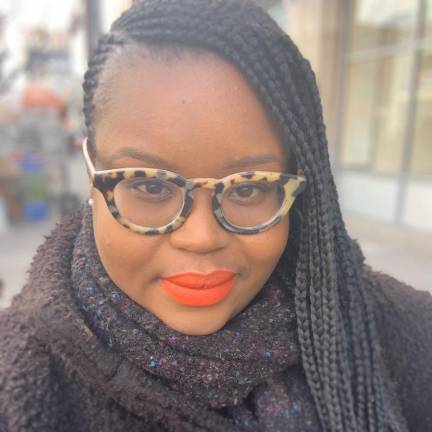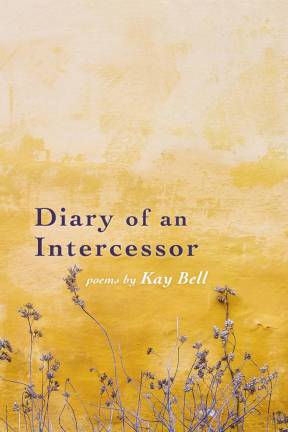‘Intervening on Behalf of Humanity’
Kay Bell talks about her spirituality and highlights the Black human experience as a mother, sister, daughter and woman in her new book of poems


Poet Kay Bell’s new book, “Diary of an Intercessor,” from Finishing Line Press, touches on ancestry, difficult childhoods, parenting, and race and class in America. She earned a BA in English and an MFA in Creative Writing at The City College of New York and served as a poetry mentor in the college’s Poetry Outreach program. Her work has appeared in numerous outlets including “Brown Molasses Sunday: An Anthology of Black Women Writers,” “The Lily Poetry Review,” “Moko: Caribbean Arts and Letters,” and “The Write Launch” just to name a few. Bell lives in the Bronx and is passionate about bringing the arts back into public schools, as well as issues that affect marginalized communities.
What inspired you to write “Diary of an Intercessor”?
I think the collection itself was inspired by my spirituality. An intercessor ... the title comes straight from the idea that an intercessor intervenes on behalf of others, and Jesus as the ultimate intercessor in the Christian faith, which I grew up in, intercedes on our behalf.
The idea came from me tapping in to my spirituality, but really trying to highlight the struggle between flesh and spirit. So how we often want to become this holy, whole person but then we struggle with so many our fleshly desires, so it’s kind of like me intervening on behalf of humanity, a story that I think that is universal. You know the struggles that we have. Aiming to be the best that we can be but still dealing with so many temptations and other things we go through in our daily lives.
How did being born in Barbados but raised in Harlem inspire many of your poems?
Yeah, it definitely did because I’ve always had a very weird relationship with God because of my upbringing. I was raised in a household that was kind of religious — in a sense. My mom would always tell me, well if you don’t do this, God is going to do this to you. And if you don’t do that, God is going to do this to you. So, I think I’ve always had this negative view of who God was and there was always a struggle to see Him differently. I know that in the Caribbean it is rather common for God to be included in school and at home. So, my mother naturally was a religious person. However, migrating to Harlem, there wasn’t a lot of that religious influence in the culture. So, there was always a struggle for me and I think even my mom.
Can you talk a little about your “Work Sonnet” poem?
So, the book not only highlights my spirituality, but I think I said this already, it highlights my human experience as well. And me, as a Black woman, I wanted to highlight some of those experiences that I’ve had in my everyday life. Things that I think at one point in my life — before I really started writing — I kind of glossed over. When I started really tapping in to who I am and my experiences, I started to see these everyday experiences as traumatic, and I wanted to highlight them. I didn’t want people to forget them. Because I think that it’s important that we understand how we treat each other, and if we are confronted with our negative behaviors, we can deal with them, and I think that will bring less chaos in our world.
This poem is about my experiences working in an office and being the first person that people see when they first enter the office, but how often people would walk right by me to talk to a white woman sitting down the hall who would then direct them back to me in the front where I was basically almost invisible. So, I just kind of wanted to highlight that to give people a glimpse of what some Black people endure on a daily basis. I think when we talk about things, that’s the beginning place where things can actually start to change.
Why is it important for young Black writers to get involved with the Harlem Writers Guild?
Harlem Writers Guild was created because the publishing world did not have room, or would not allow room for a lot of Black writers to enter, and so to level the playing field, the founders of the Harlem Writers Guild created this space of their own where Black writers — young and old — could come and celebrate each other’s writing, and give each other honest feedback. And basically, I think also create a space where we kind of understand each other’s work and the process and everything that goes into it.
I think it’s extremely important to be part of a space such as the Harlem Writers Guild because there’s so many times, I watched many of my friends enter spaces where their work was not welcomed. It wasn’t necessarily because their work was not good because sometimes when you’re telling Black stories some people won’t understand it. And sometimes when we don’t understand things, we automatically ex it out or disregard it.
So having a space, such as the Harlem Writers Guild, really allows you to get good wholesome feedback and allow those stories to live, and actually go on to find places where they can be published and celebrated. Without other Black writers and people who understand this world it’s kind of still hard for Black writers to be noticed, unless you’re a big name like Ta-Nehisi Coates, Alice Walker or Toni Morrison. But even them, I think they would probably share some of their own stories about how hard it was for people to even understand them and their writings early on. I think it’s extremely important to have groups, such as the Harlem Writers Guild just so that we have that space to be heard and be celebrated.
This interview has been edited and condensed.